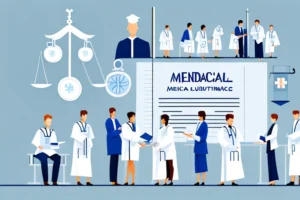
If you’re a traffic ticket lawyer, you know that attracting new clients can be a challenge. With so many other lawyers out there vying for attention, it can be tough to stand out from the crowd. That’s where SEO comes in. By optimizing your website for search engines, you can increase your visibility online and attract the right clients to your law firm.
Understanding the Importance of SEO for Traffic Ticket Lawyers
SEO, or search engine optimization, is a way to improve your website’s visibility in search engine results pages (SERPs). By using a combination of on-page and off-page techniques, traffic ticket lawyers can increase their chances of ranking higher in search results. This can lead to more website traffic, more leads, and more clients.
Why SEO Matters for Your Law Firm
The majority of people now use search engines like Google to research products and services. That means if you want to be found, you need to show up in search results. By using SEO, you can make sure that your website appears when potential clients search for terms related to traffic ticket law. This can help you attract new clients and grow your business.
For traffic ticket lawyers, SEO is particularly important because it can help you stand out from the competition. With so many criminal defense lawyers offering similar services, it can be difficult to differentiate yourself. By appearing at the top of search results, you can demonstrate your expertise and credibility to potential clients.
Attracting the Right Clients with SEO
One of the most important aspects of SEO is targeting the right keywords. You want to make sure that people who are searching for your services can find you. By targeting long-tail and niche keywords, you can attract clients who are specifically looking for a traffic ticket lawyer. This can help you avoid wasting time on unqualified leads.
In addition to targeting the right keywords, SEO can also help you attract the right clients by providing valuable information on your website. By creating high-quality content that addresses common questions and concerns related to traffic tickets, you can establish yourself as a trusted authority in your field. This can help you attract clients who are looking for a lawyer who is knowledgeable and experienced.
The Benefits of SEO for Traffic Ticket Lawyers
Overall, SEO can provide a number of benefits for traffic ticket lawyers. By improving your website’s visibility in search results, you can attract more traffic, generate more leads, and ultimately grow your business. Additionally, by targeting the right keywords and providing valuable information on your website, you can attract the right clients and establish yourself as a trusted authority in your field.
It’s important to note that SEO is an ongoing process, and it can take time to see results. However, by investing in SEO and working with a knowledgeable professional, you can create a strong online presence that will help you succeed in the competitive world of traffic ticket law.
Keyword Research for Traffic Ticket Lawyers
Before you can begin optimizing your website for search engines, you need to identify the keywords that you want to target. Keyword research is a crucial step in any SEO strategy, and it can help you attract more traffic to your website and generate more leads for your business.
Here are some tips for conducting keyword research:
Identifying High-Volume Keywords
High-volume keywords are search terms that are searched for frequently. These keywords can be very competitive, but they also have the potential to drive a lot of traffic to your website. For example, “traffic ticket lawyer” is a high-volume keyword that many traffic ticket lawyers might want to target. However, it’s important to note that targeting high-volume keywords can be challenging, as there is often a lot of competition for these keywords.
To identify high-volume keywords, you can use keyword research tools like Google Keyword Planner or SEMrush. These tools will give you an idea of how many people are searching for a particular keyword and how difficult it is to rank for that keyword.
Long-Tail Keywords for Niche Services
Long-tail keywords are more specific search terms that are less frequently searched for but have less competition. These keywords can be very useful for targeting specific areas of traffic ticket law. For example, “traffic ticket lawyer for commercial drivers” is a long-tail keyword that might be useful if you specialize in representing commercial drivers. By targeting long-tail keywords, you can attract highly qualified traffic to your website and generate more leads for your business.
To identify long-tail keywords, you can use tools like Google Autocomplete or Google Trends. These tools will give you an idea of what people are searching for and how you can tailor your content to meet their needs.
Local SEO Keywords for Targeting Specific Areas
If you have a physical location, targeting local SEO keywords can help you attract clients in your area. For example, “traffic ticket lawyer in [city]” might be a useful keyword if you have an office in a specific city. By targeting local SEO keywords, you can increase your visibility in local search results and attract more clients to your business.
To identify local SEO keywords, you can use tools like Google My Business or Moz Local. These tools will help you optimize your website for local search and improve your visibility in local search results.
By conducting thorough keyword research and targeting the right keywords, you can improve your website’s visibility in search engines and attract more traffic to your website. Remember to focus on high-volume keywords, long-tail keywords, and local SEO keywords to maximize your results.
On-Page SEO Techniques for Traffic Ticket Lawyer Websites
If you’re a traffic ticket lawyer looking to attract more clients, you need to make sure your website is optimized for search engines. By implementing on-page SEO techniques, you can improve your website’s visibility and attract more traffic to your site.
Here are some on-page SEO techniques that can help:
Optimizing Title Tags and Meta Descriptions
The title tag and meta description are the first things people see when your website appears in search results. By optimizing these elements with your target keywords, you can increase click-through rates and attract more traffic to your site. Make sure your title tag accurately reflects the content on your page and includes your target keywords. Your meta description should be a concise summary of your page’s content and should also include your target keywords.
Creating High-Quality, Informative Content
High-quality, informative content is essential for attracting and retaining visitors to your website. Make sure your content is well-written, engaging, and provides value to your readers. Use your target keywords strategically throughout your content to help improve your rankings. You can also include images and videos to make your content more engaging and shareable.
Utilizing Header Tags and Proper Formatting
Header tags (H1, H2, H3, etc.) can help search engines understand the structure of your content. Make sure you use header tags appropriately and include your target keywords in your headers. Proper formatting can also help improve readability and make your content more engaging for readers. Use short paragraphs, bullet points, and bold or italicized text to break up your content and make it easier to read.
Internal Linking and Anchor Text Optimization
Internal linking can help improve the user experience on your website and keep people on your site for longer. Make sure you link to other relevant pages on your site and use descriptive anchor text that includes your target keywords. This can also help improve your rankings for those keywords.
By implementing these on-page SEO techniques, you can improve your website’s visibility, attract more traffic to your site, and ultimately, attract more clients to your traffic ticket law practice.
Off-Page SEO Strategies for Traffic Ticket Lawyers
Off-page SEO involves activities that take place outside of your website, such as link building and social media marketing. Here are some strategies that can help:
Building High-Quality Backlinks
Backlinks are links from other websites that point to your website. They can be a powerful indicator of the quality and relevance of your website. By building high-quality backlinks from reputable websites, you can improve your rankings and attract more traffic to your site.
One way to build high-quality backlinks is to create valuable content that other websites will want to link to. This could include blog posts, infographics, or videos that provide helpful information to your target audience. You can also reach out to other websites in your industry and ask if they would be willing to link to your content.
Guest Posting on Legal Blogs and Websites
Guest posting involves writing articles for other websites in your industry. By doing so, you can build relationships with other bloggers, attract new readers, and improve your rankings by getting backlinks to your website.
When guest posting, it’s important to choose websites that are relevant to your target audience and have a good reputation. You should also make sure that your guest post provides valuable information and is not overly promotional.
Utilizing Social Media for Increased Visibility
Social media can be a powerful tool for traffic ticket lawyers. By sharing your content on social media and engaging with your audience, you can attract more traffic to your website and build your brand online.
When using social media, it’s important to choose the platforms that your target audience uses the most. For example, if you primarily work with young drivers, you may want to focus on platforms like Instagram and Snapchat. You should also make sure that your social media profiles are complete and up-to-date, and that you post regularly to keep your audience engaged.
Online Directories and Local Citations
Online directories and local citations can help improve your visibility in local search results. Make sure your business is listed on popular directories like Yelp and Google My Business, and that your information is consistent across all directories.
When creating your listings, make sure to include as much information as possible, including your business name, address, phone number, and website. You should also encourage your clients to leave reviews on these directories, as this can help improve your rankings and attract more traffic to your website.
Monitoring and Analyzing Your SEO Performance
Once you’ve implemented your SEO strategy, it’s important to track your progress and make adjustments as necessary. This will help you improve your website’s visibility and attract more traffic to your site. Here are some tools and techniques you can use to monitor your SEO performance:
Setting Up Google Analytics and Google Search Console
Google Analytics and Google Search Console are two free tools from Google that can help you track your website’s performance in search results. These tools provide valuable insights into your website’s traffic, user behavior, and search engine rankings. By setting up these tools, you can gain a better understanding of how your website is performing and identify areas for improvement.
Google Analytics provides detailed information on your website’s traffic, including the number of visitors, their geographic location, the pages they visit, and the actions they take on your site. You can use this information to identify which pages are most popular and which pages are not performing as well. This can help you optimize your content and improve your website’s user experience.
Google Search Console, on the other hand, provides information on your website’s search engine rankings. You can use this tool to track your website’s organic traffic, keyword rankings, and other important metrics. By monitoring your search engine rankings, you can identify which keywords are driving traffic to your site and which keywords you need to focus on to improve your rankings.
Tracking Keyword Rankings and Organic Traffic
Tracking your keyword rankings and organic traffic is essential to monitoring your SEO performance. By tracking these metrics, you can identify which keywords are driving traffic to your site and which keywords you need to focus on to improve your rankings. There are several tools you can use to track your keyword rankings and organic traffic, including Google Analytics, Google Search Console, and third-party tools like SEMrush and Ahrefs.
When tracking your keyword rankings and organic traffic, it’s important to look at both short-term and long-term trends. Short-term trends can help you identify immediate opportunities for improvement, while long-term trends can help you identify patterns and make more strategic decisions about your SEO strategy.
Identifying Areas for Improvement and Adjusting Your Strategy
Once you have a clear understanding of your website’s performance, you can use your analytics tools to identify areas where your strategy can be improved. This might include optimizing your content, improving your on-page optimization, or building more high-quality backlinks.
When making adjustments to your strategy, it’s important to focus on the areas that will have the biggest impact on your SEO performance. This might mean prioritizing high-traffic pages, targeting high-value keywords, or improving your website’s user experience.
By monitoring and analyzing your SEO performance, you can continuously improve your website’s visibility and attract more traffic to your site. With the right tools and techniques, you can stay ahead of the competition and achieve long-term success in search engine rankings.
Staying Up-to-Date with SEO Best Practices
SEO is a constantly evolving field, so it’s important to stay up-to-date with the latest best practices. Here are some tips for staying informed:
Following Industry Blogs and Newsletters
Follow industry blogs and newsletters to stay informed about changes in the SEO landscape. Make sure you’re following reputable sources with up-to-date information.
Attending SEO Conferences and Webinars
Attending SEO conferences and webinars can be a great way to stay informed about the latest best practices and network with other SEO professionals.
Networking with Other Traffic Ticket Lawyers and SEO Professionals
Networking with other traffic ticket lawyers and SEO professionals can help you stay informed about the latest trends and best practices. Join industry associations and attend local meetups to develop relationships and build your network.
Final Thoughts
SEO can be a powerful tool for attracting new clients to your traffic ticket law practice. By targeting the right keywords, creating high-quality content, building backlinks, and staying up-to-date with the latest best practices, you can improve your visibility online and attract more leads to your website. By following the tips in this article, you can take your traffic ticket law practice to the next level with SEO.






